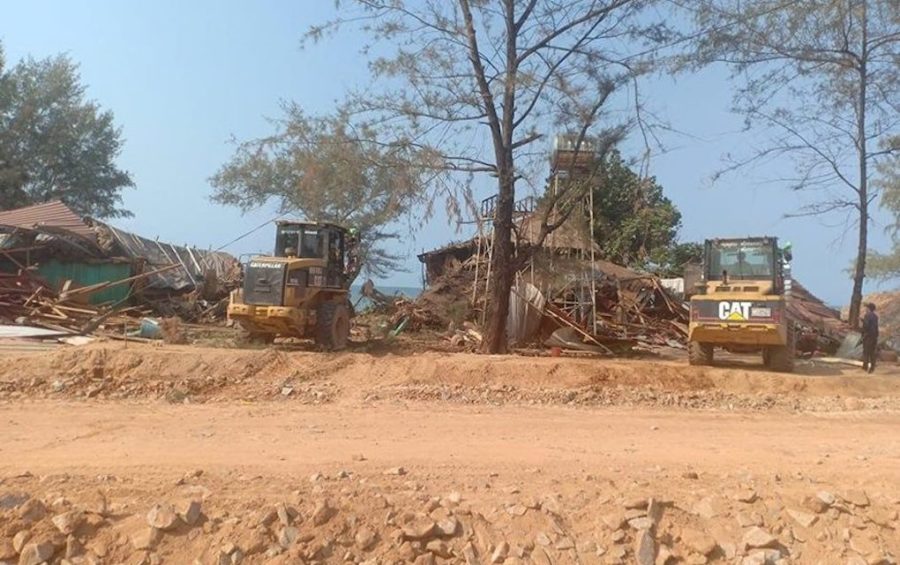Liev Kimeng sold grilled seafood in Sihanoukville’s O’Tres beach for more than a decade. Last year, she decided to take a loan to spruce up her stall, paying $2,000 a month to the bank.
But her beachfront stand — renovated and ready for a surge of tourists during the Lunar New Year holiday last month — was in the way of city authorities’ own beautification plans.
In the middle of January, authorities dismantled her stall and more than 200 others on public beaches in the city.
“I spent $13,000 for fixing and decorating my stall for high season to welcome my customers, and that money I borrowed from a bank,” Kimeng said.
“I haven’t made money since I started fixing it,” she added.
Sihanoukville authorities said they cleared vendors out of their food, drink and souvenir stalls in an effort to clean and beautify public beaches like O’Tres and O’Chheuteal.
But after rapid construction in recent years has transformed the coastal city from a local tourist and Western-backpacker haven to the epicenter of Cambodia’s Chinese-funded casino boom, the future of Sihanoukville’s beach tourism is still unclear.
Provincial authorities took apart 62 vendor stalls at O’Tres beach and 162 at O’Chheuteal on January 15, two days after announcing their plans. None of the vendors would be compensated for the loss of their businesses, according to a notice from the provincial government.
Kimeng said she had no idea what she would do in the future without her beachfront business.
“I hadn’t prepared anything yet, but they tore down all our stalls,” she said through tears in a phone interview with VOD in late January. “We are waiting for a resolution from the provincial governor, but [so far] nothing at all.”

Provincial government spokesman Kheang Phearum said beach vendors’ stalls were built on public land, and therefore they were not entitled to compensation after the stalls were demolished.
“There’ll be no new stalls built in O’Tres and O’Chheuteal beach. After reorganizing and beautifying, we’ll keep them as public areas for people to visit,” Phearum said.
He said there would be no new construction on the beaches for now because authorities needed to make them attractive for tourists. But he added that plans for restrooms, parking and beach activity areas were under consideration.
Vendors said that prior to their eviction, they had been paying a licensing fee in order to maintain their space on the beach.
Kroach Seth, owner of Sreypov O’Tres 1 guesthouse and a restaurant on O’Tres beach, said she opened her business on O’Tres in 2006 and had been paying a fee of $100 to $150 a year to provincial authorities for the last eight years.
According to Kimeng, she paid a licensing fee to operate her stand annually from 2011 until 2019. From 2011 to 2015 she paid $40 per year, and from 2016 until 2019 she paid $100 per year.
Phearum acknowledged that vendors had paid the government for their spots on the beach, but he again said that authorities were able to remove the vendors because they had been operating on public land.
He referred other questions about the vendors’ fee payments to the provincial tax department, which couldn’t be reached for comment.
Cleaning Public Beaches
Tang Sochetkresna, provincial tourism department director, said the city planned to clean the beach and then construct public restrooms, parking lots and activity areas, such as jet skiing rentals, so space on the beach for vendors would be limited.
The beach would be cleared of debris and litter in time for Khmer New Year in April, he said.
While restrooms and other amenities would take more time, they would be built before the province hosts Cambodia’s annual Sea Festival, a celebration of national tourism usually held in December, according to Sochetkresna.
“We would like to have beach facilities and services like those in other countries,” he added.
The beach at O’Chheuteal 1 could be reopened for food vendors, but he did not say when any new vendors would be allowed to sell their wares. O’Chheuteal 2 and O’Tres beaches would be left mostly clear for beachgoers, although new restrooms and parking lots would be added, Sochetkresna said.
Officials have not decided how many of the 224 vendor stalls removed last month would be allowed to return to selling on Sihanoukville beaches, he said.
“We need to develop the beach and then they need permission from local authorities [to rebuild],” the tourism director said.
Sochetkresna claimed that vendors contributed the majority of seaside litter, adding that the 20 public sanitation workers who cleaned the city’s beaches were not enough to keep them clean.
“Normally, the garbage on the beach is from the vendors. They litter when they come to sell on the beach,” according to Sochetkresna. Both construction and trash washing ashore also left beaches littered with waste, he said.
However, Lim Kimsor, an activist with environmental group Mother Nature, said that the waste produced by construction sites and sewer water dumped onto the sand and into the ocean, as well as poor planning, were the real issues.
“The problem is because of the government. They don’t have the strategy or any new ideas about how to maintain the sewers [during construction],” she said. “Now that they are rebuilding the road, there’s no place to keep the sewage water, so they bring it to the sea.”
After watching how Sihanoukville has changed amid increased foreign investment in recent years, Kimsor speculated that the public beaches could be sold off to private developers.
“I don’t see any kind [of private ownership] now, but I can maybe in the future,” she said. “Maybe this will happen to the beach.”
The city of Sihanoukville has been criticized online for overflowing trash piles and pot-hole-filled roads.
Phearum, the provincial hall spokesman, told VOD that the province’s rubbish woes were caused by delayed trash collection and various road construction.
“Some roads are jammed; some roads are installing [drainage] pipes; a lot of road construction can make it a challenge for trucks to collect trash,” Phearum said.
There are 34 sections of road currently under construction in the province, which the official said he expected would be completed by June.
Uncertain Future for Tourism
Though the number of visitors to the province have risen — with Sihanoukville International Airport counting more than 812,000 incoming passengers last year, according to Cambodia Airports spokesman Khek Norinda — some tourism operators say that massive construction growth has hurt their businesses.
Cambodia Association of Travel Agents president Chhay Sivlin said she didn’t know the city’s future plans for the beaches, but said she was confident that officials would improve them.
“We want the beach to be nice and hygienic, and especially safe for tourists who visit here in order to attract more tourists,” she said.
However, some business owners were not sure whether the government’s beautification efforts would lessen the impact of the city’s large-scale constructions on beach tourism.
Chen Suy, manager of Patchouly Chill House near O’Chheuteal beach, said she still gets frequent visitors to her guesthouse, but some have started cutting their stays short due to the city’s disruptive building boom.
“Sometimes people will book one week and they only stay one hour because the city is completely destroyed,” Suy said.
She said guests still come to Patchouly on the way to Koh Rong and Koh Rong Sanloem since boats to the two islands off Preah Sihanouk’s coast dock near the hotel, but she was concerned that she will lose patrons if the islands’ tourism draws deteriorate.
When asked if she thought beautifying O’Chheuteal and O’Tres beaches would improve tourism in the city, Suy said she didn’t know.
“Right now, the government is trying to clean the beach, but we don’t know [what will happen] because the government changes the law all the time.”
Additional reporting by Khun Vanda
(Translated and edited from the original articles on VOD Khmer)













